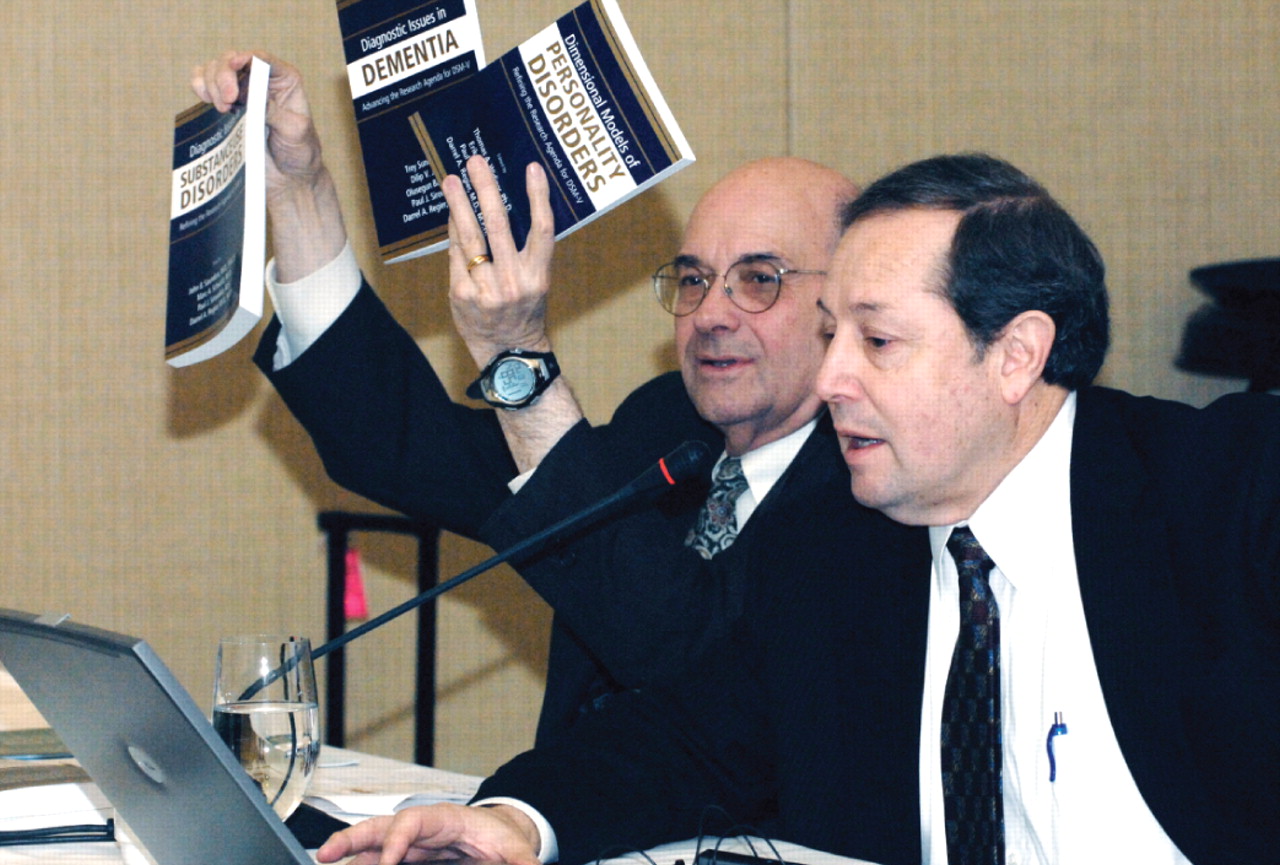APA Board Expands Review of Major Psychiatry Issues

Darrell Kirch, M.D., president of the Association of American Medical Colleges, talks to APA Trustees about physician workforce issues, skyrocketing financial burdens medical students confront, financial support for teaching hospitals, and diversity concerns.
Credit: Jack Douthitt

Jack Barchas, M.D. (left), president of American Psychiatric Institute for Research and Education, and Darrel Regier, M.D., its executive director, update the Board on a five-year NIMH grant to review the research base for DSM-V, which is scheduled for publication in 2012. Barchas is holding three books describing the proceedings of research conferences held as part of the grant.
Credit: Jack Douthitt
The APA Board of Trustees spent its most recent meeting in Arlington, Va., looking to the future as well as dealing with the day-to-day concerns of the organization and its members.
President-elect Nada Stotland, M.D., proposed the formation of three work groups, all of which were approved by the Board. They are expected to present their reports at the Board's October meeting.
In an effort to better prepare psychiatrists to respond to patients“ in a changing legal and regulatory environment” in which nonpsychiatrists are trying to expand their scope of practice beyond their training, one work group was tasked with “reinforc[ing] the unique education, training, expertise, and skills of psychiatrists” so they can better help their patients.
A second work group will study and make recommendations about some phases of APA's relationship with pharmaceutical and medical-device companies. It will work with Medical Director James H. Scully Jr., M.D., to identify the categories and amounts of monies APA and its subsidiaries receive from the pharmaceutical and other industries that offer products or services used in psychiatry. The work group will also “determine what direct and indirect financial consequences there would be from discontinuing each category; indicate how APA could adapt to the attendant change in revenue; and provide the Board with the elements of a five-year plan to end or diminish pharmaceutical revenue received by APA.”
The third work group will “build upon the 2003 report [written by former APA president Steven Sharfstein, M.D.] 'a vision for the Mental Health System' and provide the Board with information about the pros and cons of major national health care systems, as a basis for.. .formulating an APA position or policy for which to advocate with the federal administration that will take office in january 2009.”
Among other business before the Board were the following:
Scully gave a membership update, pointing out that the increase in membership has continued the slow but steady upward trend that began several years ago after a period of declining membership. APA now has 38,615 members, he noted, an increase of about 400 from 2006. | |||||
The Board voted to add Boston to the list of cities in which APA holds its annual meeting, now that the city is close to having the number of hotel rooms and amount of convention space APA requires for its huge meeting. A Boston meeting has been tentatively scheduled for 2020. | |||||
The Board endorsed a recommendation from the Elections Committee to make explicit that candidates for APA office are prohibited from posting on their Web sites letters of support written by third parties. | |||||
The Board approved a one-time emergency grant of $30,000 to be used by APA's Area Councils to support the cost of their meetings. Trustees charged the Finance and Budget Committee with determining how these funds are to be distributed among the councils and to report their conclusions back to the Board Executive Committee no later than May. | |||||
Actions taken by the Board at its March meeting will be posted in the Members Corner of APA's Web site at<www.psych.org>.▪



